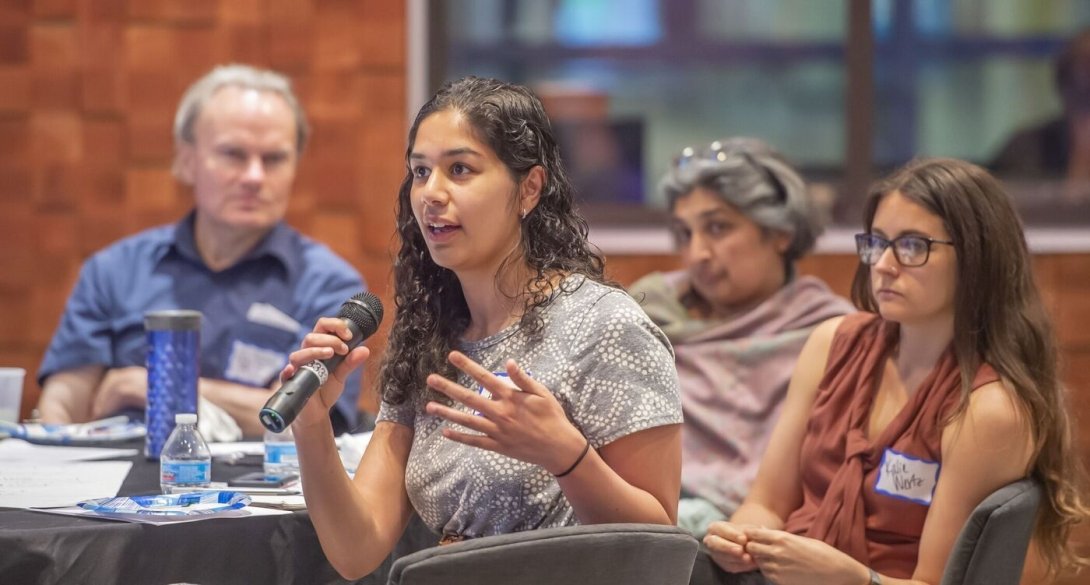Transforming Criminal-Legal System Reporting in Philadelphia

Attendees at a June event that celebrated Organizing for Neighborhood News, a collaboration among Free Press and Philadelphia groups.
Jonathan A. Wilson, WHYY
Stark inequality and poverty in Philadelphia — the poorest big city in the United States — shape how low-income communities and people of color are represented in the news.
A lack of trusting and collaborative relationships between journalists and residents creates biased coverage that can stigmatize, misrepresent and damage communities, often for generations. Harmful media narratives and misinformation in turn shape how authorities and policymakers interact with the public, set priorities and fund services — and worsen the divides of information, wealth and power.
Through the collective work of Free Press, the Media, Inequality & Change Center and Media Mobilizing Project, communities have shared time and again that their biggest frustration with local news is the reporting on the criminal-legal system.
And for good reason: News coverage that focuses on crime and violence influences how the public perceives Black and Brown communities, the poor, their own neighborhoods’ safety and actions taken by police and elected officials. But too often, news outlets prioritize speed over context, police narratives over community perspectives and sensationalist coverage over context-based or solutions-oriented reporting.
In a 2018 Tow Center study about news in urban and suburban Philly, residents of the Germantown neighborhood expressed frustration with local coverage of their community and the over-emphasis on crime. “The broad consensus was that crime incidents get exaggerated through the sheer number of stories circulated and the excessive amount of time the media spends on each story,” the report said.
Announcing the Shift the Narrative Project
The way in which Philadelphia’s news covers the criminal-legal system is ripe for wholesale reform. And in one of the most overpoliced and over-incarcerated cities in the United States, the need to transform this coverage couldn’t be more urgent.
That’s why Free Press, the Media, Inequality & Change Center and Media Mobilizing Project are excited to announce the Shift the Narrative Project, which aims to replace prevailing media narratives with complex stories about trauma, safety, crime and criminal justice.
To change narratives, we have to look at practices and structures within journalism to better understand how harmful stories around criminal justice even happen. So many factors go into this, from decisions about what’s newsworthy, to how reporters build and prioritize relationships with police, to how stories are told, and by whom, to the ownership and control of newsrooms, to the metrics outlets use to determine a story’s value.
New models are needed to spur newsrooms to break from the “if it bleeds, it leads” mentality. And communities need to be engaged in shaping and lifting up narratives that better represent them.
This three-year project, supported by the Independence Public Media Foundation, will:
-
broadly assess Philadelphia’s media ecosystem;
-
explore how the city’s media develop influential narratives;
-
seek to understand and elevate community-driven narratives on violence, crime, safety and more;
-
reimagine and reinvent the way newsrooms approach crime reporting to better center the needs and perspectives of Philadelphia’s communities;
-
innovate strategies and practices both newsrooms and communities can adopt that can explore other issue areas and be replicated in other places; and
-
offer a forward-looking vision and prescription for how urban media can be reorganized and restructured in a moment of systemic failure.
Throughout this work we’ll center people impacted by violence and the criminal-legal system — and de-center the perspectives of law enforcement, which holds too much influence over crime reporting.
We seek to build on the existing organizing and journalism work of local groups like the Initiative for Better Gun Violence Reporting, the People’s Paper Co-Op and Resolve Philadelphia that are challenging criminal-justice narratives in the city. We also aim to build on the transformative work of coalitions like the Alliance for a Just Philadelphia, the #No215jail campaign, and many others.
The project will organize journalists, newsrooms and community-media allies to connect them with residents who want to take an active role in shaping local news.
We’ll convene and connect community-based groups and local leaders, supporting them in a visioning process that surfaces the root causes of violence and the role of the criminal-legal system in that violence. That process will yield concrete steps to reshape narratives around safety and trauma. And we’ll produce research that will include recommendations for remaking media in ways that reflect communities’ information needs, especially regarding vitally important social issues like criminal-legal system reform.
New narratives, new models
Existing media have never done a good job of serving many of the same neighborhoods that suffer from biased crime reporting. That’s why it’s essential to organize with both communities and newsrooms in exploring how to better serve local needs and to create alternative models for how local news and information are produced. And we need research that will guide and sustain broader media-reform efforts in the region.
What’s needed is a complete picture of key weaknesses — and, most importantly, opportunities — to restructure local-media systems, create new narratives and institutions, and begin to shape a new kind of journalism. We hope to find opportunities to collaborate and learn from researchers, practitioners and organizations engaged in similar work in other locations domestically and internationally.
People have told us loud and clear that they want significant changes in how violence, crime, safety and trauma are depicted in local media. But transforming one of the most harmful practices in journalism will undoubtedly be a tall order. And we know this work will be slow and iterative. It’ll require that we confront powerful and interconnected institutions in media, law enforcement and the criminal-legal system.
But if we’re serious about realizing a new vision for local media — one that’s just and equitable and emphasizes community voices and needs — there are few more pressing issues than criminal-justice coverage. Stay tuned.